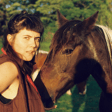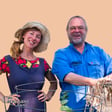
Joy Over Meaning with Elisa Rathje
Elisa Rathje lives on a small farm, on a small island, telling microscopic stories of resilience.
She's an artist, writer, filmmaker, podcaster, unschooler, grower, permaculturalist, goatherd and goose mistress whose work has fed me, and so many others, for years.
From Appleturnover Farm on Salt Spring Island (in the Strait of Georgia between mainland British Columbia, Vancouver Island and Canada), Elisa documents slow, simple approaches to skilling up and rooting down, normalising the pursuit of tiny joys.
This conversation roams between life as art, the illusion of security, community sufficiency, how to call on your inner grandma, decolonising the mind and becoming a propagator of small, ancient patterns of regeneration.
I hope you find much to savour in this sweet, soulful audio morsel. Check out + support Elisa's work!
Elisa Rathje/Appleturnover on Instagram
Elisa on The Accidental Gods podcast



















